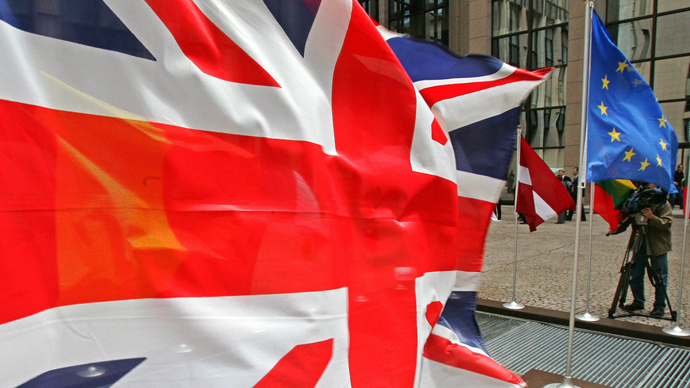A four nation poll has revealed a widening gap between the UK and rest of the EU, with attitudes on both sides of the channel hardening as UK public opinion becomes increasingly hostile towards Europe.
The survey conducted by the Observer, which polled more than 5,000 voters in the UK, Germany, France and Poland, found that the British are much more hostile towards the EU and its policies than people on the continent.
The results also found that the Germans and the French do not support giving Britain a special deal on EU membership and in fact the majority opposes doing so, with only 16% of Germans and 26% of French backing the idea.
UK Prime Minister David Cameron has said he wants to renegotiate his country’s terms of entry to the EU and then hold a referendum offering the UK electorate the new arrangement or a chance to leave the EU completely if he wins a majority in the 2015 general election.
While in other EU nations the enthusiasm for being European was high, in Britain, very few people choose to describe themselves as European.
Only 26 percent of British voters expressed a belief that the EU is a “good thing”, while 42 percent said it’s a “bad thing”. In Germany, 55 percent of respondents said “good” and 17 percent “bad”, while in Poland, which joined the block in 2004, 62 percent stated that it was “good”, with a mere 13 percent “bad”. In France a more balanced 36 percent were in favor of the EU, and 34 percent against.
Just 9 percent of Germans and 15 percent of French people stated a belief that the UK is a positive influence on the EU, with more Poles, 33 percent, taking that view.
The Europeans did not appear to be too fussed on the question of the UK quitting the EU entirely. 24 percent of the French said that a British exit would have a negative effect, compared to 36 percent of Germans and 51 percent of Poles. Over half a million Poles are thought to be working in the UK, and if the UK left the EU it is unclear whether they would still be able to do so.
In reaction to the shocking results, a cross-party alliance of some of the most powerful MPs including Deputy Prime Minister Nick Clegg and former Conservative Foreign Secretary Sir Malcolm Rifkind, has urged for pro Europeans to stage an urgent fight back against the spiraling anti-European sentiment.
“Everybody knows the EU needs reform. But simply carping from the sidelines and flirting with exit undermines British leadership in the EU, fails to deliver reform and leaves Britain increasingly isolated,” said Clegg.
He added that the UK Independence Party (UKIP) and the large swathes of the Conservative Party, which want to force Britain out of the EU, must be challenged and that “millions of jobs” in the UK depend on “the world’s largest borderless single market”.

The Labour MP and former Europe Minister, Peter Hain, said that this is a wake-up call for pro-European British people.
It “would be an utter disaster for British jobs, prosperity and influence in the world. But it is equally a wake-up call for the Brussels Bubble, which is totally out of touch with European citizens,” he said.
The survey also showed that UK citizens were more likely to feel an affinity with the US and with their European neighbors. In the case of a disagreement between the EU and the US 37 percent of UK respondents said they would support the US, while only 10 percent would side with Europe.
The UKIP leader Nigel Farage was quick to jump on the poll’s findings.
“We, on these islands, feel due to our history as a globally trading nation, much more at home with our cousins in the Anglosphere than we do with our friends on the continent,” he said.
The research also showed Britain’s well known stance on immigration, with 64 percent of voters saying the EU’s immigration policies have a negative effect. Only France at 59 percent, which is currently seeing a resurgence of nationalism, shared the same view.
At the recent EU summit in Vilnius earlier this week, the UK was again shown to be an unhappy, complaining member of the union and sparked a wave of protests from the new EU countries of Eastern Europe.
Poland, the Czech Republic, Slovakia and Hungary – the so-called Visegrad Four – blasted David Cameron for his comments on eastern European migrants who come to the UK to work.
“They are younger and economically more active than the average British workforce, they also contribute to UK national revenues far in excess of the social benefits they use,” the four said in a statement, accusing Cameron of adopting a selective approach to EU migration.
In response to Cameron’s pledge for tough new welfare rules against migrants, Romania’s Prime Minister Victor Ponta said: “We will not accept being treated as second class citizens.”
Earlier this year the French foreign minister Laurent Fabius warned Britain that it can’t pick and choose what parts of EU membership it wants and what parts it doesn’t want.
“You can’t do Europe a la carte. I’ll take an example which our British friends will understand: lets imagine Europe is a football club and you join, but once you’re in it you can’t say ‘let’s play rugby’,” he said.

